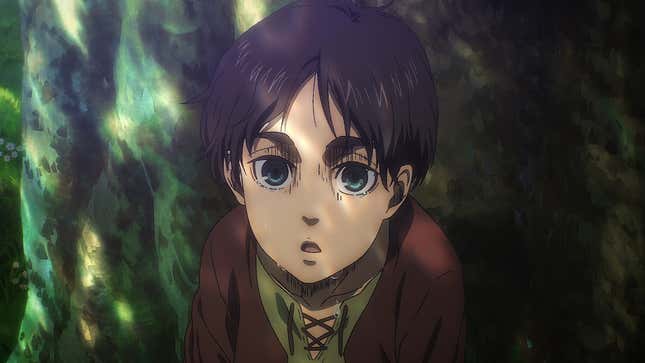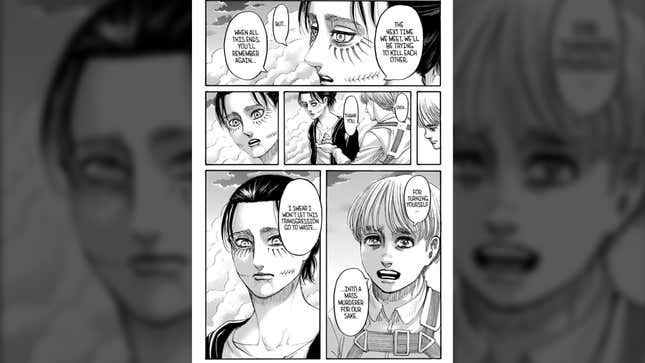
After what’s felt like a never-ending final season, Attack on Titan, the mega-popular shonen anime series, finally came to an end on November 4 on Crunchyroll and Hulu. Unlike the manga it’s based on, whose controversial ending split its fandom in half over whether the decade-spanning series was an utter disappointment or “peak fiction,” the anime smartly rewrites one crucial line from its source material, painting its ending in a better light.

Attack on Titan follows Eren Jaeger, a child soldier who uses his power to transform into a giant to save his town from invading goliaths called Titans. Somewhere along the way, the show goes from being a battle anime with horror elements akin to something like The Walking Dead to a heady political drama with fascist subtext. Turns out Eren and his friends’ home of Paradis, as well as their perilous battle against the Titans, were the result of his people’s generation-spanning subjugation at the hands of Marley, an oppressive foreign nation. The final season sees Eren turn into the villain of the show and threaten to bring about mass genocide upon the world, using his newfound titan-controlling powers to free his people from slavery.
Ahead of the finale, AoT creator Hajime Isayama revealed that he requested to be allowed to create a new script for the anime, drumming up hype among the fandom for the series to “fix” the manga’s contentious ending. Lo and behold, the hour-and-a-half-long finale is analogous to the events of the manga, with Eren defeated by his former comrades after he wipes out 80 percent of humanity. However, before Eren crosses the great rainbow bridge, he has a conversation with his best friend, Armin Arlert. This conversation, which provides some much-needed insight and closure into Eren’s genocidal new persona, plays out a bit differently (and better) than it does in the manga.
In both the anime and manga, Eren explains that his power—which allows him to exist in both the past and future—coupled with his underbaked interpretation of freedom, irreparably set him on the course of being a genocidal maniac. In short, Eren knew he would commit these atrocities before he executed them and trusted that his friends would eventually stop them and become heroes to the world in the process.
Read More: Anime Fans Still Love Attack On Titan Creator Despite The Series’ Ending
The manga’s depiction of this moment controversially has Armin comfort Eren by thanking his childhood friend for turning himself “into a mass murderer” for their sake. This jarring line ostensibly absolves Eren for his abhorrent actions and paints him as a force that united the world for the greater good. The anime, however, goes a different route by having Armin hold Eren accountable for his atrocities. As Eren passes on, Armin instead tells him, “We’ll be together. In hell.”

This alteration transforms Eren from a martyr to someone who deserves the eternal condemnation that awaits him, and aligns more closely with the message that creator Hajime Isayama envisioned their conversation communicating to fans. In a recent interview with The New York Times, Isayama revealed that he mapped out the story’s finale back when the series began in 2013, and said Eren was always meant to be a “victim who then goes through this story and becomes the aggressor.”
“My thinking there wasn’t really that Armin was trying to push Eren away for the sake of justice or whatnot. It was more that he wanted to, in a sense, take joint responsibility. He wanted to become an accomplice,” Isayama told NYT. “In order to become an accomplice, Armin had to make sure that he used very strong wording so that he could take those sins upon himself. And so that was the intent behind it.”
In the NYT interview, Isayama admitted to feeling pigeonholed when writing Eren’s evolution throughout the series, and yearned for the freedom to deviate from his original concept of the manga’s ending.
So the truth is the situation with Eren actually overlaps in a certain sense with my own story with this manga. When I first started this series, I was worried that it would probably be canceled. It was a work that no one knew about. But I had already started the story with the ending in mind. And the story ended up being read and watched by an incredible number of people, and it led to me being given a huge power that I didn’t quite feel comfortable with.
It would have been nice if I could have changed the ending. Writing manga is supposed to be freeing. But if I was completely free, then I should have been able to change the ending. I could have changed it and said I wanted to go in a different direction. But the fact is that I was tied down to what I had originally envisioned when I was young. And so, manga became a very restrictive art form for me, similar to how the massive powers that Eren acquired ended up restricting him.
Read More: Attack On Titan Is Getting A ‘Bonus’ Manga Chapter 2.5 Years After Its Divisive Ending
All in all, I think the anime’s revisionist take on Eren and Armin’s final conversation improves the ending by having characters hold Eren accountable for his genocidal actions. Let’s just hope that Isayama’s forthcoming bonus Attack on Titan manga chapter doesn’t undo what the anime’s finale accomplished. If worse comes to worst, we’ll always have Code Geass.